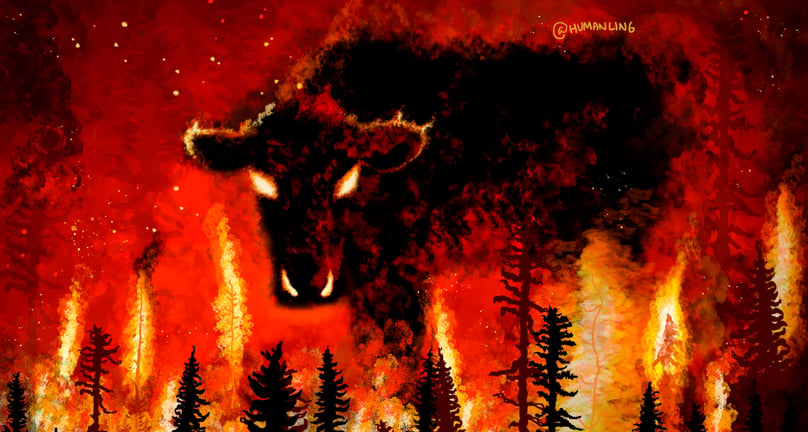Eating in the Anthropocene
This blog is written by Summer Rangimaarie, a executive member of OraTaiao, The New Zealand Climate and Health Council. This is an organisation that advocates for equitable, intelligent, and appropriate climate & health policy. Summer discusses the interconnectedness of the climate catastrophe, food systems, and health.
The hot, thunderous storms of climate change loom overhead. No longer are these tempests on the horizon; they are here in the Australian infernos and record-breaking droughts in New Zealand.
As members of SFC probably already understand, climate change represents perhaps the most cosmic threat humanity has ever faced. While it may be world-ending, combating climate change could be a vehicle for reforming the problematic systems that got us here.
I’m Summer Rangimaarie, a student at the University of Auckland in my final year of a Master in Health Sciences in Nutrition & Dietetics. I’m also a new executive member of OraTaiao, The New Zealand Climate and Health Council - an organisation that advocates for equitable, intelligent, and appropriate climate & health policy.
My interest in climate change sprouted from a seemingly unlikely soil.
I was given my own first laptop in 2011. 16 and limitless, I spent hours perusing younger versions of YouTube and Tumblr at a time when content was less tightly policed by guidelines and algorithms. A curiously low-quality video thumbnail piqued my interest. It was footage of farms and slaughterhouses. I had never witnessed anything as horrifying as conscious cows hoisted onto hooks, screaming pigs, or the wanton disposal of useless chicks.
I remained in a perpetual shock at how animals are used for their outputs. I eventually arrived at an animal product-free lifestyle as a meaningful political action for distancing myself from processes involving animals. The threads connecting animal abuse, environmental destruction, and climate change unravelled quickly.




Animal agriculture drives climate change.
To state the obvious - climate change is underpinned by capitalism. Profit-driven thinking and systems incentivize the prioritization of capital, at whatever cost – whether it is the climate, animals, or people.
Animal agriculture is one of the largest sources of greenhouse gas emissions globally. Precious forests are razed to make way for animals and their food, rendering environments more susceptible to climate-sensitive disasters. In New Zealand, ruminant animals are responsible for nearly a third of all emissions produced. This is unsurprising given dairy alone accounts for 18% of all exports from NZ (2018), but an economic reliance on emission-heavy products makes our environment more susceptible to future damage.
A couple of us eating climate friendly diets is not enough to get us out of this mess, but population-level changes in food - what some experts call the necessary ‘Intergenerational Dietary Shift’ - would go a long way towards the fight against climate change. In order to stay within Earth’s capacity for food production, a ‘combination of substantial shifts toward mostly plant-based dietary patterns, dramatic reductions in food losses and waste, and major improvements in food production practices’ are required.
The Western diet tends to have below optimal amounts fruit & vegetables, excessive salt sugar fat, and simple carbohydrates, and is high in red meats - a pattern strongly associated with increased risks of chronic diseases. Reforming diet is not just a matter of individual health or morality. Illnesses associated with low-quality diets are expensive; obesity, cancers, heart disease, and diabetes account for hundreds of millions in annual expenditure. A recent study found that some plant-based foods have far smaller emissions footprints than animal-based foods in New Zealand. Current evidence illustrates that a low-emissions plant-based diet also has major health gains. More plant foods in your diet can therefore improve your health and the climate simultaneously!
This isn't to say the ethical and environmental failures of food systems are the result of an individual’s purchasing choices. However, we must collectively challenge dangerous processes and systems that contribute to climate change - especially unsustainable food production and consumption.
The food systems in Aotearoa would not exist without colonisation, which brought animal agriculture and eventually the globalized food network to our shores (permitted by dispossession of Maori land). Refusing industrial animal products and other emission-heavy food in favor of local plant-based foods is a way to decolonize your diet. Maori conceptions of the relationships between people, the environment, and other species offer philosophical challenges of food systems. Animals are no longer the silent faceless gears in industrial processes, but are better understood as sentient beings with their own whakapapa (simply: heritage/descent) and who should be respected. The natural world does not exist simply to be pillaged for its resources, and climate change can be viewed as a retaliation to the wholesale abuse of the environment.
“Māori narratives and knowledges and the practices associated with them, can problematise Western hierarchical notions of the dominant human subject over the passive animal object through their acknowledgement of our genealogical connections. Kaimangatanga is but one example of an ethical framework that might result from this worldview”.
Kirsty Dunn - Kaimangatanga: Maori Perspectives on Veganism and Plant-based Kai
Convincing industry, countries, and families to change the way they approach food has myriad considerable challenges. What constitutes a healthy diet varies between populations, cultures and countries. Worsening food insecurity also reduces families’ ability to access healthy food. Ineffective and inequitable climate policy can exacerbate the negative effects of climate change on already vulnerable people. Imposing restrictions & consequences on harmful processes is also incredibly difficult to do, owing to the immense power industries have. Current and future climate actions need to be triple-duty; they must recognize and address the interconnectedness of climate catastrophe, food systems, and health. Each of these issues are uniquely challenging, but arise from the same conditions. Systems that harm our health, animals, and the environment must change. This is even more evident amid the COVID-19 pandemic, which has revealed opportunities for Aotearoa to shift its priorities and policies in a way that equitably benefits all.
OraTaiao advocates for equitable & intelligent climate & health policies. If you are interested in climate news, updates, and actions, you can sign up for free (or with a small donation) to become a member of OraTaiao. We have monthly board meetings that any member is welcome to attend - a great thing if you want to get to know climate & health policy in Aotearoa! Feel free to contact me at summerfromearth@gmail.com if you are interested in OraTaiao, or just want to kōrero about nutrition & climate change.
